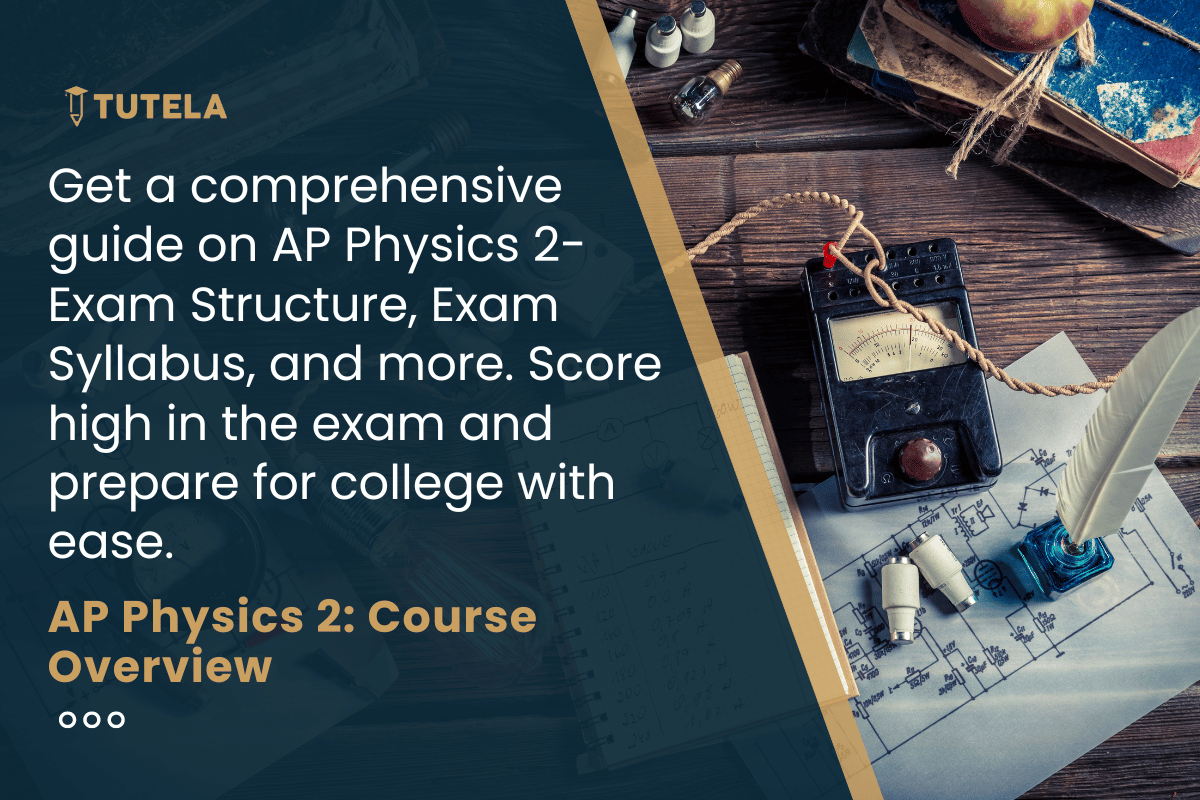
Welcome, Physics Enthusiasts, to an enthralling exploration of AP Physics 2! Whether you're preparing for the AP exam or delving into the wonders of electricity, magnetism, and fluid dynamics, get ready for an enlightening journey. The AP Physics 2 Exam date is scheduled for 17th May 2024. For other AP Exams 2024 dates and test center information, please refer here.
In this blog, we aim to be the go-to guide for students, breaking down the entire syllabus of AP Physics 2 in a concise and engaging manner. From advanced fluid mechanics to the mysteries of electric circuits, we'll navigate the essential principles of physics.
| Unit Name | Description | Weightage in the Exam |
| Unit 1: Fluids | This unit typically covers the behavior of fluids, including liquids and gases. Topics include fluid statics, fluid dynamics, and the principles of buoyancy. | 10-12% |
| Unit 2: Thermodynamics | Thermodynamics deals with the principles governing energy transfer and transformation. Topics covered include laws of thermodynamics, heat transfer, and various thermodynamic processes. | 12-18% |
| Unit 3: Electric Force, Field, and Potential | This unit involves the study of electric charges, electric fields, and electric potential. Fundamental concepts such as Coulomb's law and Gauss's law are covered. | 18-22% |
| Unit 4: Electric Circuits | Electric circuits focus on the study of the flow of electric current in circuits. Topics include Ohm's law, Kirchhoff's laws, and circuit analysis techniques. | 10-14% |
| Unit 5: Magnetism and Electromagnetic Induction | This unit explores the behavior of magnets and the generation of electric currents through electromagnetic induction. Topics include magnetic fields, Faraday's law, and Lenz's law. | 10-12% |
| Unit 6: Geometric and Physical Optics | Optics is the study of light. Geometric optics deals with the behavior of light rays, while physical optics explores phenomena like interference and diffraction. | 12-14% |
| Unit 7: Quantum, Atomic, and Nuclear Physics | This unit delves into the principles of quantum mechanics, the structure of atoms, and nuclear physics. Topics include quantum theory, atomic models, and nuclear reactions. | 10-12% |
1. Multiple-choice section: This section comprises 50 questions and lasts for 1 hour and 30 minutes. It covers various topics, including fluid dynamics, thermodynamics, electric forces, fields, potentials, circuits, magnetism, electromagnetic induction, and optics.
2. Free-response section: This section consists of 4 questions and lasts for 1 hour and 30 minutes. It assesses students' ability to solve complex physics problems and communicate their understanding through written responses.
1. Physics and Astrophysics: AP Physics 2 serves as a continuation of the physics journey, providing essential principles for students pursuing majors in physics and astrophysics.
2. Electrical Engineering: The study of electricity, magnetism, and circuits aligns with the curriculum of electrical engineering majors, offering a comprehensive understanding of these principles.
3. Mechanical Engineering: Advanced topics such as fluid dynamics and thermodynamics contribute to the knowledge base required for mechanical engineering majors.
4. Environmental Science: Understanding fluid dynamics and thermodynamics is relevant to environmental science, where knowledge of these principles aids in analyzing environmental processes.
5. Materials Science: The course's coverage of electromagnetism and optics is valuable for students exploring materials science, where an understanding of these principles is crucial.
6. Biophysics: For those interested in the intersection of physics and biology, particularly in understanding electrical and optical phenomena in biological systems, AP Physics 2 provides relevant insights for biophysics majors.
7. Aerospace Engineering: Knowledge of fluid dynamics and thermodynamics is essential for students aiming for careers in aerospace engineering, where an understanding of these principles is fundamental.
8. Computer Engineering: The study of electric circuits and electromagnetism is directly applicable to computer engineering, contributing to success in hardware design and development.
9. Applied Physics: The course aligns with the curriculum of applied physics majors, providing a comprehensive understanding of advanced physics principles.
10. Renewable Energy Engineering: Understanding thermodynamics and fluid dynamics is crucial for students interested in the field of renewable energy engineering, where efficient energy conversion is a key focus.
TutelaPrep’s College Navigator allows students to search for colleges based on their preferred country and course. Not only that, it also provides valuable insights into each college’s specific admission requirements for those exams. Through College Navigator, you can even connect with alumni at your chosen colleges to get a firsthand feel for campus life and academics.
We hope this article helped you with the subject knowledge. Reach out to us by filling out our assistance form if you need any help with the preparations.